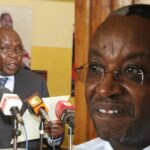Northlands City, one of Kenya’s largest real estate developments, has recently become the focus of intense speculation.
The project’s funding and its possible connection to the Eurobond scandal have raised questions in both political and public circles.
The Eurobond issue, which involved Kenya raising a substantial amount of money from international markets, became a major controversy when doubts were raised about how the funds were spent.
In 2014, Kenya made headlines by issuing its first Eurobond, securing over Ksh. 280 billion.
The funds were intended for infrastructure development across the country, a move that was initially seen as a positive step toward boosting the economy.
However, by 2015, opposition leaders, particularly Raila Odinga, began to express concerns about the transparency of the funds’ usage.
Odinga, along with other critics, questioned whether the money was being used as intended, leading to a heated debate in the political arena.
The situation became more complicated when the then Auditor General, Edward Ouko, released a report indicating that a significant portion of the Eurobond funds could not be traced to specific government projects.
This revelation fueled suspicions of misappropriation, with many wondering where the money had gone.
The government’s assurances that all funds were accounted for and used appropriately did little to quell these concerns.
Around the same time that questions about the Eurobond were emerging, the Kenyatta family embarked on the development of Northlands City, a massive 11,000-acre project located north of Nairobi.
Valued at over Ksh. 500 billion, Northlands City is set to be one of the most ambitious real estate projects in Kenya’s history.
The timing of the Eurobond funds and the rise of Northlands City led critics to draw connections between the two, speculating that some of the Eurobond proceeds might have been diverted to finance this private venture.
Despite the allegations, there is currently no concrete evidence to support the claim that Eurobond funds were used to develop Northlands City.
The government, including then-President Uhuru Kenyatta, has strongly denied any wrongdoing, maintaining that all Eurobond funds were allocated to public projects as intended.
The Kenyatta family, whose name is prominently associated with Northlands City, has also dismissed the allegations as baseless, emphasizing that the development is a private business venture unrelated to the Eurobond issue.
The Eurobond scandal remains a thorny issue in Kenyan politics, with many feeling that the full story has yet to be revealed.
The connection to Northlands City, while speculative, has only added to the mystery surrounding the Eurobond funds.
For many Kenyans, the lack of clear answers continues to fuel suspicion and distrust in government dealings.
The development represents a significant investment and will have a major impact on the region’s economy and infrastructure.
Yet, without definitive proof to either confirm or refute the alleged link to the Eurobond, the shadow of controversy may continue to loom over this ambitious project.
The speculation surrounding Northlands City and its potential connection to the Eurobond scandal highlights the ongoing challenges of transparency and accountability in Kenya’s financial management.
Whether the truth behind these allegations will ever be fully uncovered remains to be seen, but for now, the debate continues to stir up emotions and questions in Kenya.





















Add Comment